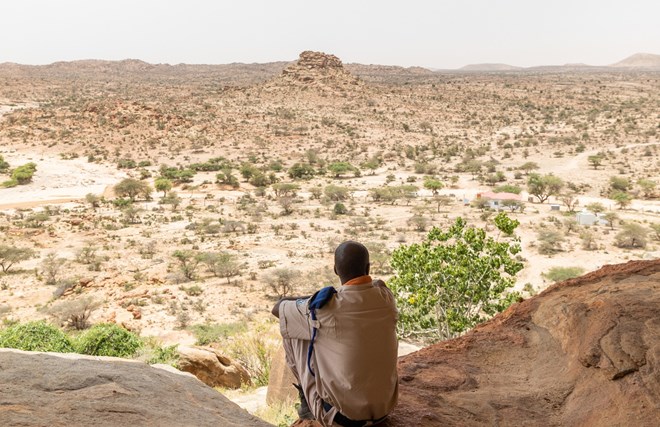Tuesday March 21, 2023
By Damon Bristow and Khadija Mohamed Almakhzoumi
 Photo by Reuters/ Eric Lafforgue
Photo by Reuters/ Eric LafforgueClimate change is all around us. The damage it is causing to Somalia is obvious to all Somalis – and that is why it is at the core of the UK and Somalia’s work together.
Despite contributing little to climate change, Somalia is one of the most vulnerable countries in the world to its effect. In the past 30 years, Somalia has experienced long droughts and unpredictable and at times extreme rainfall, which have become more intense and, frequent. The recent and ongoing drought is the longest in the last four decades, with an unprecedented five failed rains. We know the effects – displacement and food insecurity, affecting nearly half the population. The last drought in 2016-17
led to damages and losses of over USD 3.25 billion, requiring support costing USD 1.77 billion. Somalia has seen severe flooding and locust infestations and is projected to experience shifts in long term climatic conditions such as temperatures and sea level rise.
As much as Somalia is not responsible for climate change, the loss of forests and the decline of the environment is making it worse. That is why today, on International Day of Forests, we welcome the steps being taken to address deforestation.
It is an urgent challenge. From 1990 to 2010, Somalia
lost nearly one in five of its trees (an estimated 18.5% of forest cover). The
illegal charcoal trade and domestic energy demand accounts for much of this. That means nearly a third of land is now degraded. This makes the impacts of climate change worse. The loss of trees and vegetation causes soil to erode, and reduces the quality of the soil that is left. This means that land previously thriving for agriculture and farming becomes useless. Across the Horn, around 10 million livestock have already died because of the current drought – rebuilding those herds will be extremely difficult if the destruction of forests and agricultural lands is not addressed.
Somalia’s initiative to address deforestation through a
tree planting drive is extremely welcome. As well as the important first steps being taken to reforest Somalia through this initiative, the new Ministry of Environment and Climate Change is taking further steps to improve the regulation of forest use and halt drivers of deforestation. The passing of the Environment Bill is a crucial step. We recognise the Government and Parliament: this will help put Somalia on the path to greater resilience to climate shocks.
The UK is playing its part supporting Somalia to tackle climate change. Our support has helped vulnerable communities to prepare for, mitigate and recover from the impact of climate extremes, through natural resource management, building social and financial assets to support livelihoods, and delivering key health and nutrition services. In Gedo for example, farmers are reporting that thanks to water investment and agriculture training, they are able to farm and sell vegetables and improve their income. “The project provided us with methods and technologies to help with that. It has had a lot of impact on our farming abilities. Many people who would have moved because of the drought stayed because of the project,” claimed a community leader in the village of Bandar.
Helping provide alternative livelihoods instead of the unsustainable use of trees is key. The UK funded research into the use of Non-Timber Forest Products at the Government’s request. It identifies some ways this can be done, and which species are suitable. Investment in Agroforesty services and policies is key: planting different and improved varieties of crops; and finding alternatives to charcoal. There is also an important role for Somalia’s other international partners to play. For example, in continuing to enforce the charcoal ban on export to the Gulf, which has been positive in reducing this driver of deforestation.
To help Somalia cope with climate change, access to climate finance is key. This must be aligned to a clear plan for action, to help communities and the economy adapt to climate change. The UK and Somalia will continue to partner on this key issue.
Damon Bristow is the Development Director at British Embassy in Mogadishu. Khadija Mohamed Almakhzoumi is Somalia's Minister of Environment and Climate Change.